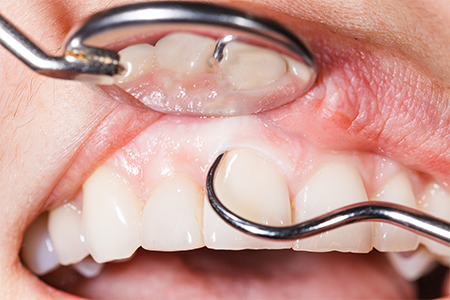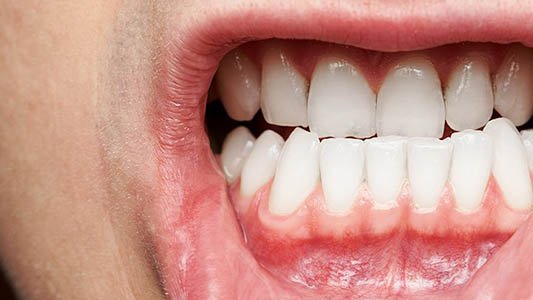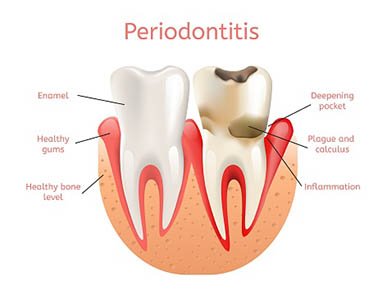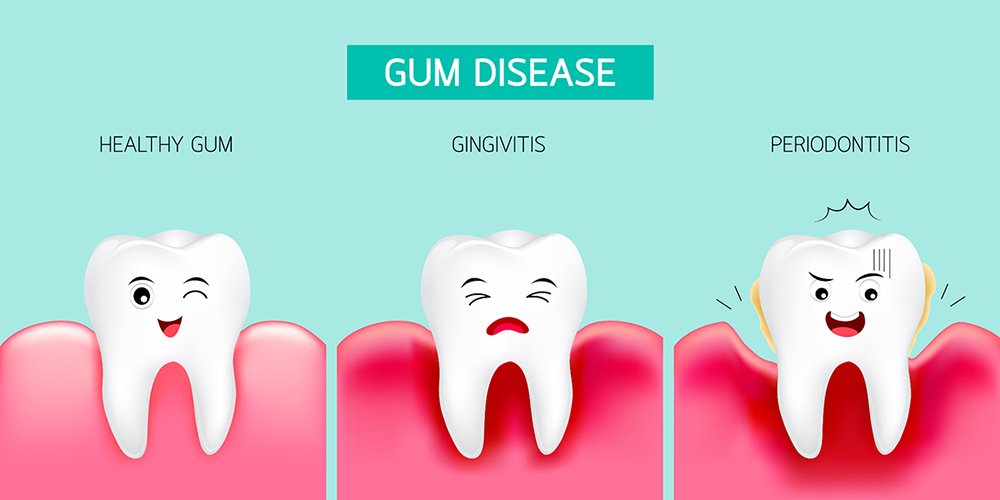Gum Disease (Periodontal disease) is a widespread condition that is often slow-moving and hard to detect outside a professional dental setting.
It affects bone encompassing teeth and causes it to degrade. It is a higher cause of tooth loss than even dental decay. In many cases, it is not painful and goes unnoticed until the dentist makes you mindful of it. More than 75% of Canadians have some gum disease incidence, and there are connections between gum disease and other conditions. Dr. Hawryluk Jr. will check for signs of Gum disease and plan to address this prevalent dental condition.
Periodontal disease is an umbrella term for both gingivitis and periodontitis. Both are perpetual bacterial infections that can affect one tooth or many teeth. Gingivitis is the mildest and causes the gum to become red, edematous, and bleed easily. There is usually little or no discomfort and often correlates with inadequate oral hygiene. It is reversible with dental treatment and good oral home care. At the early stages of gum disease, plaque (a bacterial film) that exists around a tooth solidifies into calculus (tartar). As plaque and calculus start to build up, the gums begin to subside from the teeth and pockets form between the gum and the tooth. At this stage, it is fully reversible with conservative treatments. As gum disease advances, the gums recede further, wrecking more bone and around the root. Eventually, the teeth involved may become mobile and may need removal.

To learn more about gingivitis, please visit us here:
Untreated gingivitis can advance to periodontitis, which is a condition causing bone destruction. With time plaque can spread and grow below the gum line. Poisons produced by the bacteria in plaque can irritate the gums and stimulate inflammation, aggravating, and degrading the bone. As the disease progresses, more demolishment of bone and gums ensues. It can start with very mild symptoms and eventually lead to loss of teeth. Up to 30% of people may be genetically more vulnerable to gum disease. Even with proper oral care habits, these people may be six times more likely to develop bone loss around their teeth. Early interceptive treatment is vital in this circumstance. During your Mississauga dental office visit, Dr. Hawryluk will do a complete dental exam to determine if you have any signs of gum disease.
Research indicates periodontal disease can contribute to an elevated predisposition to a heart attack or stroke. Bacteria found in dental plaque contribute to coronary artery disease. People with gum disease are two times more likely to endure a fatal heart attack and three times more likely to suffer a stroke than individuals without this gum ailment. A connection also exists between periodontal disease and diabetes in that gum disease can hamper our body’s ability to control blood sugar levels. Diabetes can cause our blood vessels to thicken, which reduces the flow of nutrients to our gums and slows the evacuation of harmful waste products.

There are several warning signs of gum disease which include the following:
- Red swollen or painful gums
- Bleeding while brushing and flossing
- Loose or separating teeth
- Pus between the gums or teeth
- Persistent bad breath
- A change in the way your teeth fit together
Your bone and gums should fit cozily around your teeth. Gum disease destroys the bone and gums, forming ‘pockets’ around the teeth. Over time the pockets can become more in-depth, which provides a larger space for harboring bacteria, resulting in an escalation of bone loss. To retain your teeth for your whole life, you must expel all the plaque from your dentition every day with proper brushing and flossing. Frequent professional cleaning at St Lawrence Dentistry will remove tartar from places where you cannot reach with the floss. Use a delicate bristled toothbrush that will minimize trauma to your gums. Devices such as Water Pik and interproximal brushes are excellent but will only remove all plaque if used in conjunction with brushing.

To learn more about dental cleanings at St. Lawrence Dentistry, please visit us here:
If you have neglected your teeth for a long time, there has been some permanent, irreversible damage. Once St. Lawrence Dentistry has gotten bacteria in your mouth under control, and your mouth returns health, repair of dental recession is possible.
To see how Dr. Hawryluk repairs dental recession, please visit us here:
The uplifting news about gum ailments is that in most cases, St. Lawrence Dentistry can help you arrest bone loss, treat gum recession, and prevent further damage. Please call us if you would like an appointment at our Mississauga office.
Reference: The Patients Guide to Dentistry
- St. Lawrence Dentistry Looks Forward To St. Patrick’s Day! - March 12, 2025
- Understanding Dental X-Rays and Radiation: What You Should Know - January 13, 2025
- Happy New Year from St. Lawrence Dentistry! - December 30, 2024










